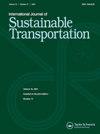能源可再生、经济增长、交通和气候脆弱性:政策见解
IF 3.9
3区 工程技术
Q2 ENVIRONMENTAL STUDIES
International Journal of Sustainable Transportation
Pub Date : 2025-06-03
DOI:10.1080/15568318.2025.2505963
引用次数: 0
摘要
本研究考察了经济增长(GDP)、能源可再生(RE)和气候脆弱性之间的关系,重点关注基于可再生能源和交通运输的GDP。考虑到方法学前景,采用了系统广义矩和面板分位数回归分析。这些数据是在2008年至2021年期间从22个亚洲国家收集的。此外,本研究将其国家划分为世界银行收入部门,并进行了更深入的分析。为此,专家组被分为四组,即22个亚洲国家(总体组)、高收入国家(HICs)、中上收入国家(UMICs)和中低收入国家(LMICs)。本研究考察了EKC模式是否适用于GDP和气候恢复力,以及可再生能源如何影响这种关系。研究结果表明,国内生产总值增加了气候脆弱性,而国内生产总值和可再生能源的综合效应降低了大多数国家的气候脆弱性。当引入可再生能源作为调节因子时,GDP与气候脆弱性之间的关系从u型曲线转变为倒u型曲线。这些发现对减轻气候脆弱性具有重要的政策意义,并表明调节可再生能源可以支持可持续可再生能源并增强气候适应能力。本文章由计算机程序翻译,如有差异,请以英文原文为准。

Energy renewability, economic growth, transportation and climate vulnerabilities: Policy insights
The current study examines the relationships among economic growth (GDP), energy renewability (RE), and climate vulnerability, focusing on GDP based on RE and transportation. System-generalized moments and panel quantile regression analysis were employed considering the methodological prospects. The data was collected from 22 Asian countries from 2008 to 2021. Further, this study segregated its countries into the World Bank income division and analyzed more deeply. For this purpose, the panels are divided into four groups, i.e. 22 Asian (overall group), high-income (HICs), upper-middle (UMICs), and low-middle-income countries (LMICs). This study examines whether the EKC pattern holds for GDP and climate resilience and how RE influences this relationship. The findings indicate that GDP contributes to increased climate vulnerability, whereas the combined effect of GDP and RE reduces climate vulnerability in most countries. When RE is introduced as a moderating factor, the relationship between GDP and climate vulnerabilities shifts from a U-shaped to an inverted U-shaped curve. These findings have significant policy implications for mitigating climate vulnerability and indicate that regulating RE can support sustainable RE and increase climate resilience.
求助全文
通过发布文献求助,成功后即可免费获取论文全文。
去求助
来源期刊
CiteScore
8.90
自引率
2.60%
发文量
56
期刊介绍:
The International Journal of Sustainable Transportation provides a discussion forum for the exchange of new and innovative ideas on sustainable transportation research in the context of environmental, economical, social, and engineering aspects, as well as current and future interactions of transportation systems and other urban subsystems. The scope includes the examination of overall sustainability of any transportation system, including its infrastructure, vehicle, operation, and maintenance; the integration of social science disciplines, engineering, and information technology with transportation; the understanding of the comparative aspects of different transportation systems from a global perspective; qualitative and quantitative transportation studies; and case studies, surveys, and expository papers in an international or local context. Equal emphasis is placed on the problems of sustainable transportation that are associated with passenger and freight transportation modes in both industrialized and non-industrialized areas. All submitted manuscripts are subject to initial evaluation by the Editors and, if found suitable for further consideration, to peer review by independent, anonymous expert reviewers. All peer review is single-blind. Submissions are made online via ScholarOne Manuscripts.

 求助内容:
求助内容: 应助结果提醒方式:
应助结果提醒方式:


